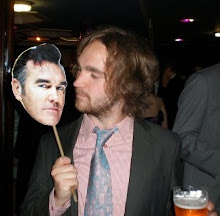On top of a hill, far far away, in deepest darkest Eastern Europe - let's say, Transylvania - there lies a castle, a building tall and sinister standing menacingly amidst it's surrounding area.
If you get inside said building, the first thing that grabs you is the decor. Gothic paintings of overpaid prima donnas adorn the walls, posturing whilst idiots scream behind them. Secondly, one hears a distant cackling coming from a room a few stories up. A piercing, cocky laughter usually reserved for Apprentice contestants serves to suggest that this is the laugh of a business magnate. Your worst suspicions are confirmed as you make your way to the door from which the laughter emanates, the sign on the door reads:
Rupert Murdoch CEO.
Of course Rupert, like the rest of us, has been reading of the sad demise of Setanta Sports over the past few days. Unlike the rest of us, or this lonely scribe at least, Rupert is very happy about it.
I enjoyed Setanta Sports. I liked the down-to-earth Premiership coverage (albeit mostly showing menial games). I liked the German and French football highlights. I passed many hours watching Liverpool or Arsenal TV, and loved the wonderfully in-no-way-biased analysis and matches to be found there. I liked Chris Waddle and Craig Burley's co-commentary, even if you couldn't understand them half the time. I'm well known to have a medium-sized crush on Rebecca Lowe and a massive man-crush on James Richardson, so their Football Matters summary show was, like Richardson's Guardian Football Weekly, a pun-derful delight. My brusque Welsh housemate also tells me Setanta's great for Boxing too, so I'm gonna take his word for it.
But what I probably liked the most was the fact that, here I was, watching good football on the telly (and Liverpool TV. HONK!), safe in the knowledge that my subscription had not lined Rupert's pocket, and had financed a competitor to Sky Sports, a station so smug and self-important Simon Cowell would find it overbearing.
But, therein lied the problem. A competitor to Sky Sports was never going to have an easy ride, even with the minimum 23 Premiership matches guaranteed by the European commission.
In this country, Sky have benefitted enormously from the Premier League and the monopoly they hold with it, able to charge a massive amount for their product. When Setanta joined the competition, Sky were not prepared to give up their powerful position. If anything, their position strengthened: rescheduling dictated that despite losing 46 games to Setanta, they were able to show 92 games with the new deal, 4 more than they showed the previous season.
These 92 matches - 46 more matches than their rival - included first dibs on games with the lucrative 'A' game package and meant that, along with much brand loyalty, Sky were undoubtedly still wearing the Premier League trousers, and as such were able to price their rival out.
Sky customers had, essentially, the same package as the season before, only this time, consumers had an optional channel to subscribe to: Setanta, offering 46 Premiership games for 12.99 a month. Over £50 pounds a month for football on telly? Unsurprisingly, consumers voted with their feet, and Setanta have been unable to get past 1.1 million subscribers, whilst needing 1.9 to break even.
So Rupert's happy then. And Nick Woolnough, it seems. Sky see off a serious competitor, and re-establish their position as 'the home of football', a common claim made by their shameless marketing department, whilst the consumer continues to pay through the nose for-the-most-exciting-league-in-the-world-with-four-teams.
Subscribe to:
Post Comments (Atom)

2 comments:
I hereby, from now and forever, subscribe to the latest thoughts of Mr Phil Woodward.
oh, well that's very kind of you mr gaskin! thanks a bunch!
Post a Comment